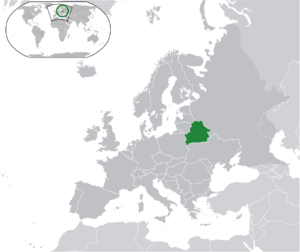Republic of Belarus
| Republic of Belarus Рэспубліка Беларусь | |
|---|---|
Map of Belarus
| |

|

|
| Flag | State Emblem |
This article may require copy editing for grammar, style, cohesion, tone, or spelling. |
| Part of a series on |
| Former socialist states |
|---|
| List of states |
|
Albania · Bulgaria · Czech Republic · Slovakia · Germany · Hungary · Mongolia · Poland · Romania · Former Soviet Union (Armenia · Azerbaijan · Belarus · Estonia · Georgia · Kazakhstan · Kyrgyzstan · Latvia · Lithuania · Moldova · Russia · Tajikistan · Turkmenistan · Ukraine · Uzbekistan) |
| Politics |
| Opinions of socialism · Reactionism (Eurasianism · National Bolshevism · Religion · Decommunization · Banderism) · Western influence (NATO expansion · Color revolutions) |
| Issues |
| Demographic crisis · Economic issues · Poverty · Post-Soviet conflicts |
Belarus is a capitalist state in Eastern Europe and former constituent republic of the USSR, having declared independence on 25 August 1991. It is aligned with Russia and is opposed by the West, and has been ruled by President Alexander Lukashenko since his election in 1994 after the adoption of the new constitution which established a presidential system; with Lukashenko since having consolidated power. Belarus is not socialist, as the means of production are in the hands of either private individuals or the state, and in the former there is plenty of state control however this only makes Belarus state capitalist, not socialist. Belarus also has one of the world's biggest public sectors in proportion to the national economy, being about half of the total, however this too does not make it socialist.[1] Belarus's ruling party and leadership are not socialist and do not strive for socialism, and at most Belarus may be called socialist in the sense that Ba'athist Iraq or Libya under Gaddafi were "socialist", which is basically social democracy with large amounts of state ownership. In spite of all this, Belarus does have several socialistic aspects to it:
- Its state emblem (equivalent to a coat of arms in other countries) is pretty much the same as the one used by the Byelorussian SSR except the hammer and sickle is replaced with an outline of Belarus, though the red star, red ribbon, globe, and bundles of wheat remain as is common with socialist emblems.
- The Belarusian parliament has a large statue of Lenin right in front of it.
- It has maintained government control over key industries and has not engaged in mass privatization like other former socialist countries.[2]
Lukashenko furthermore has quite a communist background himself. He joined the CPSU at around the age of 25 in 1979, holding various management and party posts from 1982 to 1990, whereupon he was elected to the parliament of the Byelorussian SSR. Near the end of the USSR he founded a faction called "Communists for Democracy", which lasted until 1992 and argued that the Soviet Union declined due to a lack of democratic participation as well as the corruption and parasitism within the bureaucracy,[3] espousing communist principles and opposing the dissolution of the Soviet Union throughout.[4] This sort of rhetoric helped Lukashenko to later win the 1994 election with 80.6% of the vote with 70.6% turnout, which even the West admits was a free election. The following elections however were disputed, especially the 2020 one where Lukashenko got a sixth term and which led to mass protests, Western countries not recognizing Lukashenko as the legitimate leader, and EU sanctions on Belarus.[5]
External links
References
- ↑ List of countries by public sector size. Wikipedia.
- ↑ What Are The Biggest Industries In Belarus?. World Atlas.
- ↑ Belarus: Dictatorship or Democracy?. globalresearch.ca.
- ↑ Alexander Lukashenko. Britannica.
- ↑ Belarus: EU imposes sanctions as Lukashenko orders police to clear the streets. Sky News.
